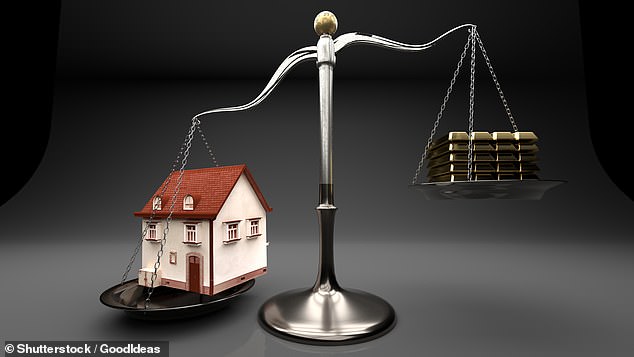My daughter is taking out a mortgage on her own after a divorce, how can I help? DAVID HOLINGWORTH replies
I helped my daughter buy her current house, but unfortunately her husband decided he wanted to leave the marriage.
She wants to stay in the property to reduce the impact on the children and could pay the mortgage herself.
She is currently undergoing a conveyancing process to relieve her husband of the title deeds and mortgage.
She will pay £130,000 to buy out her husband, leaving £164,000 on the mortgage, at a fixed rate of 1.29 per cent with two years to run.
SCROLL DOWN TO FIND OUT HOW TO ASK DAVID YOUR Mortgage question
Mortgage Help: In our weekly Navigate the Mortgage Maze column, real estate agent David Hollingworth answers your questions
I want to help her and am trying to figure out how much more I can give her for the mortgage, taking into account the early repayment costs.
With most of my money tied up in my Cash Isa and Stocks and Shares Isa, I’m trying to work out the best arrangement.
I thought about donating another £75,000 to bring her mortgage down to £90,000, and overpaying from then on. I know it’s complicated, and even more so if I don’t understand the tax implications.
David Hollingworth replies: I’m sorry to hear that your daughter’s marriage has broken up, but it sounds like there are some positive options open to her and she clearly has your support if she and her ex-husband reach a settlement.
It is not possible for me to provide figures on the value of the property, or whether the settlement amounts are correct.
That might be something your daughter could seek advice from her lawyer on, if she hasn’t already done so, to see if there is a way to arrive at an independent valuation figure that everyone will be comfortable with.
A low mortgage interest rate is an advantage
The good news is that your daughter can afford to take over the existing mortgage and buy out her ex-husband.
Taking over the existing mortgage and raising additional capital to buy out a partner is often a problem for those who want to continue living in the family home.
But it appears she can meet the required amount without increasing the loan, along with any other support from you.
The mortgage lender will want the mortgage to remain affordable in one name. Refinancing an existing mortgage with one income instead of two can often be difficult.
Besides the fact that the lender who agrees to the mortgage can switch to one name, the other good news is the interest rate.
A mortgage interest rate of 1.29 percent is now unattainable because we have moved to a higher interest rate environment.
Having such a low interest rate will make the mortgage more affordable for the remaining few years and give some time to plan for the end of the deal.
> What next with the mortgage interest rate and should you fix it for two or five years?

Save or pay too much? David Hollingworth advises that it would be worthwhile to build up savings at a higher interest rate, with mortgage rates at 1.29%.
Is it better to keep the money in the piggy bank?
You are clearly keen to help your daughter further reduce her mortgage over time.
Because the mortgage interest rate is so low and your savings interest rate is so much higher, I think you may wonder whether now is the right time to reduce the mortgage so significantly.
Savings rates are so much higher than current mortgage rates that cash on deposit could earn more than the cost of the mortgage, even if taxes have to be paid on the interest.
You might therefore want to consider whether a strategy of putting money into higher-yield savings could ultimately help you significantly reduce the mortgage when the current deal expires.
As you have indicated, early repayment costs will undoubtedly be charged during the remaining term of the fixed-rate period.
Most lenders allow part of the mortgage to be paid off without any ERC. Normally this is 10 percent of the mortgage balance, but some lenders can offer even more flexibility, with up to 20 percent overpayments allowed without incurring a penalty.
If you are aiming to reduce your debt faster despite the low rate, then using the available ERC-free allowance makes sense.
Ask the lender what that amount amounts to, as some will base it on the outstanding balance each year, while others will use the original balance.
The fee itself will likely be a percentage of the amount repaid, and will often decrease each year until the flat rate expires.
Unless it is essential to reduce the mortgage balance immediately, these costs are probably better avoided.
If you or your daughter can save in an account with a higher interest rate, a larger balance can be built up, which can significantly reduce the mortgage at the end of the term.
We have to assume that rates will still be higher at that point, but at least you will have taken advantage of the current low point to put your daughter in a better position.
As you are gifting some significant amounts of money to your daughter, you may wish to obtain specialist advice to consider any implications from an inheritance tax perspective.
NAVIGATE THE MORTGAGE MAZE
Some links in this article may be affiliate links. If you click on it, we may earn a small commission. That helps us fund This Is Money and keep it free to use. We do not write articles to promote products. We do not allow a commercial relationship to compromise our editorial independence.
